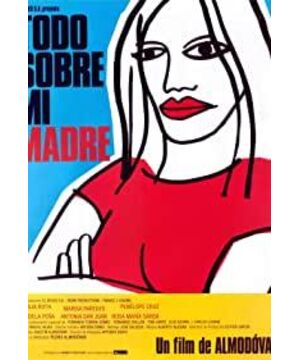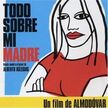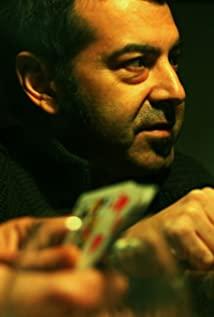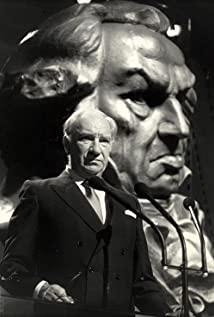1. The death
film starts with a group of medical facilities and constantly printing stiff curve EEG, showing the first and most direct picture of death. As the introduction to the whole "symphony", it foreshadows the contradictory theme of death and regeneration. At the time of death, all the characteristics of life are only height, age, and weight. This status symbol of death reappeared twice later: Rosa's father asked Rosa and Manuela how old they were respectively, reflecting the death of fatherhood and the re-establishment of Manuela's identity. This is also an in-depth theme of death.
It is worth mentioning here that the lack of a father’s role as a sub-theme has been repeatedly expressed in Almodóvar’s films. In this film, it is not only reflected in Rosa’s father forgetting his fatherhood due to Alzheimer’s disease, but also reflected Because Lola didn't know the existence of the two Esteban at first. In addition, Uma's strong affection for Nina and her unrequested characteristic of giving her all her heart and soul undoubtedly contain the element of maternal love, which also conveys the ardent maternal love that is difficult to get rid of and the lack of a father role at the same time.
The second scene of death is the scene where Esteban was hit by a car. Esteban’s perspective shot, the composition of the dimly slanted street in the rain and the corner of the mother’s red windbreaker plus the cry of sorrow that seems to be far away, reveals a strong tragic appeal. Successful suicides rarely appear in Almodovar's films. The surly destiny often directly controls death. Therefore, the greatest tragedy of death lies in the pain of mourning that it brings to the living, not the death itself. The next scene in which Manuela’s son is notified of the death is a simulated short film resurrection. This technique has appeared many times, such as the four trains between Barcelona and Madrid. The plot complex contains the dual meaning of prediction and remembrance, and it must be established when the complex is presented, so it expresses the impossibility of recurrence and the deceptiveness of prediction, or the foresight of hindsight. It is the "impossibility" of the complex that doubles the emotions and even overwhelms them. The simulation short film promotes how to accept the reality and agree to the organ transplant, but it does not explain how to get redemption from the great grief after that, how to realize self-regeneration when the meaning of life has suddenly lost like a walking dead, and this is exactly what the film wants to show Theme of.
The recurrence of the third death was at Rosa’s funeral, but the more important aspect is that the demons and plagues in Laura Manuela’s mouth appeared for the first time in a desperate and beautiful image, which Almodóvar called it. "The appearance of death is a bit like the white-faced man in black in "The Seventh Seal"" "a kind of elegant, great, whitewashed death". Lola's rich personality and inner life are constantly told and never presented. She is the eternally absent, deconstructor, dying and hurt person, and this is also the characteristic of death. In contrast, the transgender Agrado is ubiquitous and vibrant. After Laura became a female body, she still retains certain male qualities such as fatherly love, which may be the most beautiful emotion. Laura is too tall, too beautiful, too man, and too feminine, he is not measured; Agrado is almost completely feminine: "The closer we are to our ideal self, the more we can become ourselves." These two possible lifestyles and different life beliefs of transgender people, no matter how extreme they are, are the true colors presented in the sublimation of life. On the other hand, Lola’s excessive consumption of life and Manuela’s introverted grief are also in strong contrast, while the former is ultimately redeemed from death and the latter’s self-regeneration through dedication.
2. Women and Emotions In
Almodóvar's film, the cruel and cruel inner quality blooms like the red cloth of the Spanish bullfighter. Emotions are the only driving force for the development of the plot and the actions of the characters. Emotions have become the second theme of this symphony.
In this film, Manuela’s loss of a child is the driving force of the whole plot. Almodóvar said, "The pain I'm talking about up to now is caused by broken love, loneliness, and uncertainty about love... But the pain of losing a child is incomparable." Manuela was totally desperate, she A series of actions are mechanized behaviors that cannot be done by himself under the huge inertia of life: signing the consent form for organ donation, tracing the heart of his son, and boarding the train to Barcelona. Almodovar once commented on Cecilia (playing Manuela): "Her face is very tense, but this is because she has no expression on her face." A woman's body is a container for all grief, and the lack of expression on her face reflects the mechanization of action. Before she was exposed to every possibility: helping the assaulted prostitute, walking into the open dressing room, answering Uma "No, where are you going?", every step without consciousness is like stepping on the void It's not true and at the same time, he has become more courageous. In the absence of his own identity, he hopes to help others as much as possible. And she also gradually found her own coordinates in helping others, and realized her own rebirth in forming a new family with Rosa's son.
Uma's feelings for Nina are another motivation. Uma said, "She is obsessed with drugs, I am obsessed with her." From Uma's appearance, the huge poster with the uncompromising face of amazed confrontation, to the end, he said to Manuela, "I saw The desperate look in your eyes, the purity of looking directly at the audience, will run through the desperate love. Rehearsing the scene of "Looking for Roca", Uma vigorously rubbed the soil mixed with blood, summarizing emotions to art. She is the extreme of such a kind of woman: She is elegant and independent, in control of everything but completely controlled by love, lonely and smoky ("My life is like a plume of smoke"), possessing strong emotional intelligence and expressive power, usually a writer Or actors.
In the scene where four women meet together, the director expresses his feminine theme. Even if they experience their own sadness, despair and eternal loneliness, the kindness of women's nature can make them come together naturally. Perhaps more important than natural kindness is the ability to understand each other without having to talk, like Manuela’s sharp evaluation of Uma, "You are top-notch in acting, but emotionally fascinated by the authorities." This is based on their possession. The comfort of the same body and the same container that stores pain is difficult for a cold group of the opposite sex to give. In the previous scene of seeing the doctor, Manuela told Rosa his story, saying, "Women can bear everything for fear of loneliness." Rosa said, "Women are tolerant." Then Manuela said, "Women It's shit". The ability of women to dissolve the despair of life is what Almodovar is trying to explore instead of just praising women's tolerance, and the answer in a woman's heart may be "Fanghua is afraid of being alone."
3. Features of artistic expression The
film has a compact narrative and uses a lot of omissions. For example, a shot of Manuela in La Coruña peeping at the person who received his son’s heart is discharged from the hospital, Dongdong’s heart fades to the shot of his son’s room in Madrid, and then cut to the close-up of the train, three scenes across Manue Pull the most desperate time, compactness makes the pictures and events have a sense of dumping, and brings a strong heart shock. Another example is a few train scenes, no scenery outside the car, no other passengers, no platform, a close-up of a monologue, and a tunnel of memory that seems to have no end. Different from the ordinary train scene, the director's narrative is so precise, as the saying goes, "There is no fresh story, only fresh lips."
The director added a lot of his favorite elements to the film-creation, such as Esteban as a writer, Rosa's mother as a second-rate painter, Uma, Manuela and Agrado in professional or amateur styles respectively Acting and living in a creative way. Esteban undoubtedly has the shadow of the director himself. They have gone through a similar creative process, but in different forms. They all want to hear their mother talk about creation. They may even like to create or conceive in a cafe. The director is here. A lot of personal emotions are poured into the characters. Almost all the heroines in this film have varying degrees of talent for acting. Uma, Manuela, Agrado, they stretch the beauty of life to the extreme in their acting.
The film's borrowing of the movie "All About The Eve" and the drama "A Streetcar Named Desire" has postmodern and meta-film characteristics. In addition to the title (the English name of the film is "All About My Mother"), the director also parodyed the experience of Eve, the heroine of "Comet Beauty": in the original film, Eve secretly wrote down her lines with a sense of fame and revenge. Manuela was to help Uma and redeem himself. Jean-Marc Lalande wrote: "Manuela, the'new Eve'... overturned the bad role assigned to her in the origin myth. She calmed everyone's pain and helped others wholeheartedly." Almodo Wa Ni's use of "Comet Beauty" is actually to rewrite the original sin of the original mythology of women being tempted by evil snakes and return them to the original role of multiplying, inclusive, and appeasing everything, a mockery of the Christian subconscious patriarchy.
"A Streetcar Named Desire" is one of the most important clues of the film, and two lines repeatedly appear: "I always rely on the kindness of strangers" and "I will never come back again, never will". The former highlights Uma’s involvement in the play, and it is a tribute to the unity of women who have resisted the test of life. The latter corresponds to Manuela’s life trajectory: she is a certain sense of Stella, then she When she left Lola with the youngest, this sentence may have been stuck in her mind. Later, she repeated Stella's experience again in Madrid.
4. Conclusion
"Everything About My Mother" has rich and hierarchical themes, including almost every theme in Almodóvar's movies. Death and emotion are like two intertwined main themes, sneaking, spinning, sliding, flying, some recurrences of phrases throughout the work, inlaid to form a dense and powerful ensemble, and the only possible center is Almodóvar. Spain, Madrid forever.
References:
"Movies of Desire" Frederick Strauss, People's Literature Publishing House 2007
"Pedro Almodova-The Man Who Subverts Tradition" Paul Obadiah, Jiangsu Education Publishing House 2006
"Film Criticism" Dai Jinhua, Peking University Press 2004
--------------------------------------- ------------------------
The essay in the film intensive reading class is confused in thought and language is impassable. It is identified as the theorem by Xiaoo. Now I only write a central sentence and then expand it with examples, and only the basic vocabulary is left. For example, I can't think of a replacement. "Very strong" words~ The title and conclusion are added after writing, pretending not to match up~ They
are just put here as a commemoration of the film intensive reading class, eh~
View more about All About My Mother reviews











